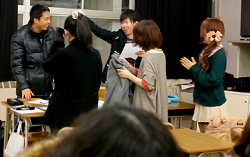Adult Learning and Development
![]() Exploring disparate philosophies and applications of adult education practice can help identify principles for more effectively facilitating perpetual learning that benefits adult learners and society. Emerging research shows that adults have an amazing capacity to learn at all stages of life and that adult education practice provides a broad array of possibilities for enriching individuals' lives while meeting society's needs.
Exploring disparate philosophies and applications of adult education practice can help identify principles for more effectively facilitating perpetual learning that benefits adult learners and society. Emerging research shows that adults have an amazing capacity to learn at all stages of life and that adult education practice provides a broad array of possibilities for enriching individuals' lives while meeting society's needs.
No single approach or theory seems to address the diverse abilities and needs of adult learners adequately, the multiple missions of institutions, and the changing needs of society. Rather than imposing myopic philosophy and ideology, adult educators can be more effective by adapting practice to the dynamically interacting needs of the student and the environment.
- Details
- Written by Brent A Duncan, PhD
Decades of research into student attrition offer a bevy of conflicting causes and cures for dropouts. However, the consistent factor most research identifies as a key antecedent to student persistence is faculty.
Considering the faculty connection to student persistence, I conducted focus group research with faculty at two universities that specialize in adult higher education to discover best practices for fostering adult-student goal commitment. Combined with an extensive review of retention literature in traditional higher education environments, the research suggests that universities with a myopic focus on institutional-centric "retention" initiatives may only make matters worse.
- Details
- Written by Brent A Duncan, PhD
Self-directed learning is a process by which individuals take initiative in planning and implementing their own learning (Merriam, Caffarella, & Baumgartner, 2007; Brookfield, 1995). While generally applied in adult learning environments, adults are hardly unique in their ability to be self-directed (Piaget & Inhelder, 2000). Anyone who has seen a child devour books on dinosaurs, explore the biology of a backyard or scour the Internet for cheat codes on the latest video game has seen the powerful potential of self-directed learning in a child’s life.
- Details
- Written by Brent A Duncan, PhD
This section analyzes the assumptions, criticisms, and applications of three prominent adult learning models: Andragogy adult learning models, Andragogy experiential learning, and self-directed learning.
- Details
- Written by Brent A Duncan, PhD
Principles emerge when theory meets reality and practitioners discover what actually works in specific situations. Various authors have proposed principles of adult learning, with many lists overlapping or referencing the others. The common characteristics that Maehl [1] finds in the various lists are that adults are different from youth, are capable of learning, are needs-based learners, and are complex learners.




![Your brain can keep growing, adapting, and learning at any age, if you are willing to put in the effort [Image: Copilot]](/images/Images/best-years-for-adult-brain300.png)

